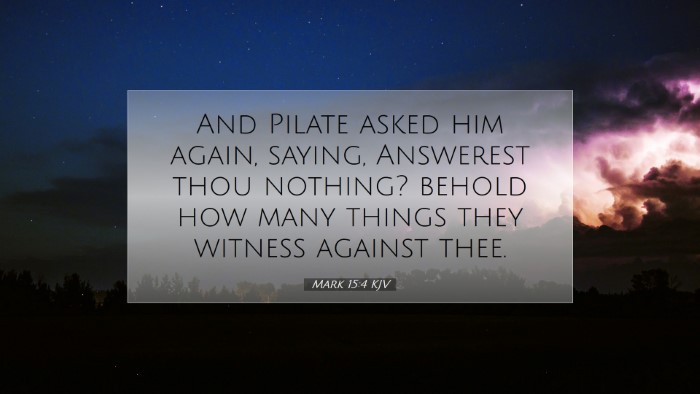Commentary on Mark 15:4
Verse: "And Pilate asked him again, saying, Answerest thou nothing? behold how many things they witness against thee." (Mark 15:4)
Introduction
This poignant moment in the narrative of Mark’s Gospel highlights the tension between worldly authority and divine truth. Here, Pilate, the Roman governor, is confronted with the silent dignity of Christ amidst accusations. This commentary synthesizes insights from various public domain sources, delving into the significance of Jesus' silence and the implications of Pilate's questioning.
Pilate’s Inquiry
As Pilate questions Jesus, it reflects the profound confusion of the political and spiritual upheaval of the time. According to Matthew Henry's Commentary, Pilate's inquiry is symbolic of the larger struggle between human judgment and divine purpose. Pilate represents a ruler caught in a moral quandary, seeking to discern truth amidst a chaotic sea of accusations.
The Silence of Jesus
Albert Barnes notes that Jesus’ silence is a fulfillment of the prophetic scripture, particularly Isaiah 53:7 which declares, "He was oppressed, and he was afflicted, yet he opened not his mouth." This silence is profound; it speaks louder than words and demonstrates Christ's submission to the plan of salvation. The silence is not one of defeat, but rather a deliberate choice to not offer defense against lies and false witnesses.
Witnesses Against Christ
The "many things" [a multitude of accusations] bring to light the nature of the charges laid against Jesus. Adam Clarke points out that the accusations stemmed from envy and hatred. The religious leaders sought to silence Him out of fear for their own power and position. The contrast between their false witnesses and Christ's unwavering truth reveals the moral depravity prevalent in the society of that day.
Theological Implications
- Divine Sovereignty: The events surrounding Jesus’ trial emphasize God’s control over human affairs. Pilate's inability to find fault in Jesus and yet succumbing to pressure illustrates humanity's penchant for self-preservation over righteousness.
- Fulfillment of Prophecy: This moment serves as a critical junction in fulfillment of Old Testament prophecy regarding the Messiah's suffering, aligning with the greater narrative of redemption.
- Challenge to Authority: Jesus’ demeanor poses a challenge to earthly authority and invites believers to reflect on true power and the integrity of witness.
Pastoral Applications
- Encouragement in Silence: Pastors can draw from Jesus’ silence as a source of comfort for those facing false accusations or unimaginable trials. It teaches that sometimes suffering and endurance are a part of our witness.
- Standing for Truth: The account challenges believers to stand firm in their faith, even when faced with overwhelming opposition and societal pressures.
- Trust in Divine Justice: Like Pilate, modern rulers and leaders must reckon with the recognition of truth; thus, believers are encouraged to trust in God's ultimate justice rather than the flawed judgment of humanity.
Conclusion
Mark 15:4 serves as a powerful reminder of the intersecting themes of authority, truth, and sacrifice. By synthesizing insights from Matthew Henry, Albert Barnes, and Adam Clarke, we gain a multifaceted understanding of this pivotal moment. Jesus’ silent suffering reveals his commitment to the divine mission while simultaneously exposing the moral failings of human systems. As pastors, students, and theologians reflect on this verse, they are invited to contemplate the depth of Christ’s resolve and the implications for their own spiritual journeys.


